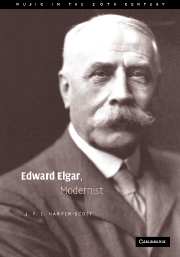Book contents
- Frontmatter
- Contents
- Preface
- 1 Styles and ideas
- 2 A Heideggerian refinement of Schenker's theory
- 3 Immuring and immured tonalities: tonal malaise in the First Symphony, Op. 55
- 4 ‘Fracted and corroborate’: narrative implications of form and tonality in Falstaff, Op. 68
- 5 Hermeneutics and mimesis
- 6 The annihilation of hope and the unpicking of identity: Elgarian hermeneutics
- 7 Modern music, modern man
- Glossary
- Bibliography
- Index
5 - Hermeneutics and mimesis
Published online by Cambridge University Press: 03 May 2010
- Frontmatter
- Contents
- Preface
- 1 Styles and ideas
- 2 A Heideggerian refinement of Schenker's theory
- 3 Immuring and immured tonalities: tonal malaise in the First Symphony, Op. 55
- 4 ‘Fracted and corroborate’: narrative implications of form and tonality in Falstaff, Op. 68
- 5 Hermeneutics and mimesis
- 6 The annihilation of hope and the unpicking of identity: Elgarian hermeneutics
- 7 Modern music, modern man
- Glossary
- Bibliography
- Index
Summary
Heidegger, Schenker, music, and modern musicology
I begin this chapter by making it clear how the concluding pair ought not to be read. There are two principal reasons why this is necessary. First, the question must arise why I choose Heidegger as a basis for my approach to a musical hermeneutics when the names of J. L. Austin, Hans-Georg Gadamer, Michel Foucault, and Jacques Derrida are more familiar, and have been put to interesting use in recent years in this context. I believe in the binding necessity of acknowledging the hermeneutic circle in the fullest possible sense, but choose to be led round it by Heidegger rather than the others, because I believe that Heidegger is a better grounding than they are for a musical hermeneutics. Gadamer seems to me a more persuasive follower of Heidegger than Derrida, but while some of Gadamer's refinements of Heidegger are valuable, and I shall call on them occasionally, the original arguments are still the most useful guide to hermeneutic enquiry, not least because Heidegger's hermeneutics extend beyond the interpretation of texts into the interpretation of human being and Being as such. I should therefore explain where I disagree with some of the philosophy underlying wings of ‘the new musicology’, and at the same time pre-empt new-musicological criticisms of my own hermeneutic strategy. My argument is essentially ontological, being concerned with the nature of music, and my claim is that Heideggerian thinking can keep a hermeneutics solidly on track.
- Type
- Chapter
- Information
- Edward Elgar, Modernist , pp. 154 - 183Publisher: Cambridge University PressPrint publication year: 2006

